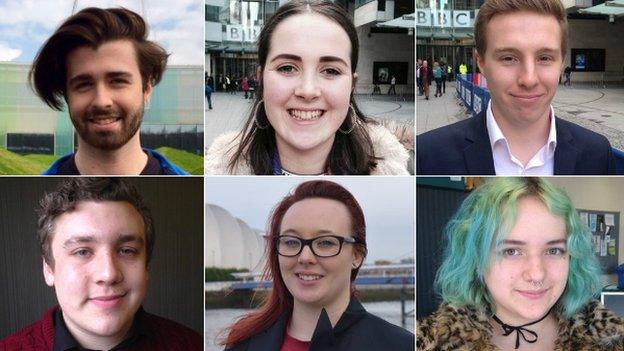Election 2015: How effective is the use of 'alternative' social media?
- Published

Clockwise from top left: Jordan Lee-Pirrie, Amy Sprinks, Danny Angove, Honor Cooke, Eva Murray and Jordan White
Politicians are increasingly using social media platforms such as Instagram, Pinterest, Google Plus and Tumblr to connect with voters, in particular young people. But is it having the desired effect?
BBC News asked six members of Generation 2015 for their verdicts.
Jordan Lee-Pirrie, 20, lives in London and is training to be a professional dancer.
"I think it's a bit strange. Twitter and Facebook have a key direction of connecting, commenting, sharing, etc and that's why they're the most popular," he said.
"Instagram, for example, is different because it is much more about the aesthetic. You're looking to make that picture look perfect and beautiful.
"I guess, especially with Instagram, it would make them [politicians] seem a lot more real, but their political agenda seeps so deeply into their public image that it's hard to see the real from the staged."

Amy Sprinks, 18, tweeted, external: "I think it can be incredibly effective if done well, but if done badly it looks like a clumsy way to connect with 'youngsters'."
Another Twitter user, Eva Murray, 20, said she believed the use of social media had engaged many young voters.
"It allows them to feel part of and connect with politics and politicians more than before," she wrote, external.
But another Generation 2015 voice, 23-year-old Jordan White, said he believed "only Facebook & Twitter" had "the ability to reach a wide scope audience."
Honor Cooke, 17, said, external: "Not Tumblr, and who even uses Google Plus?? Twitter and Facebook though, definitely."

Danny Angove, 19, is studying at the University of London.
He thinks using different kinds of social media is a "great idea, because it will help to engage young people with politics."
He said: "Teenagers and young adults are becoming increasingly more likely to be regularly using Instagram, Tumblr and Vine than they are to be routinely checking Facebook, for example, so any attempts a politician makes at using these more 'youth-oriented' social networks can only work in their favour."
But the English student thinks politicians should try to adapt their content for each individual social network.
"I'm sick of seeing the same boring posts repeated across each of the politicians' social media pages," he said.
"I think that people (and not just young people) are more likely to warm to a politician who posts entertaining, casual and funny messages than they are to one who just repeatedly broadcasts his party's manifesto. I'd definitely follow (and pay attention to) a politician's posts on social media, as long as they were entertaining."
- Published12 April 2015
